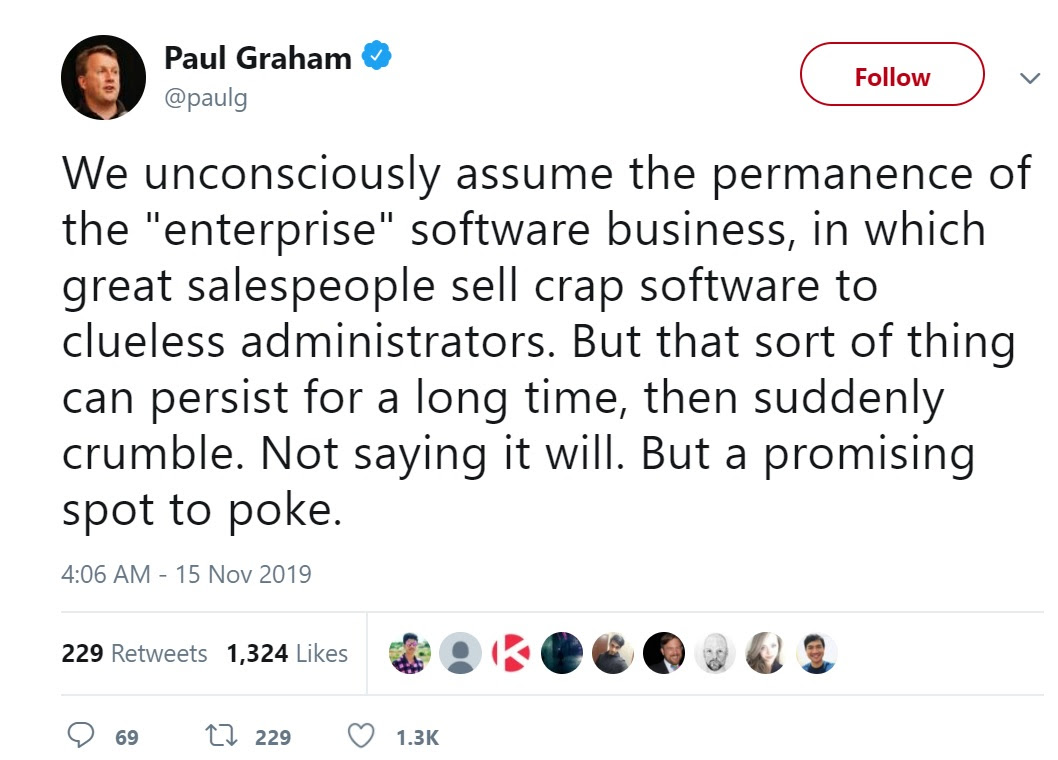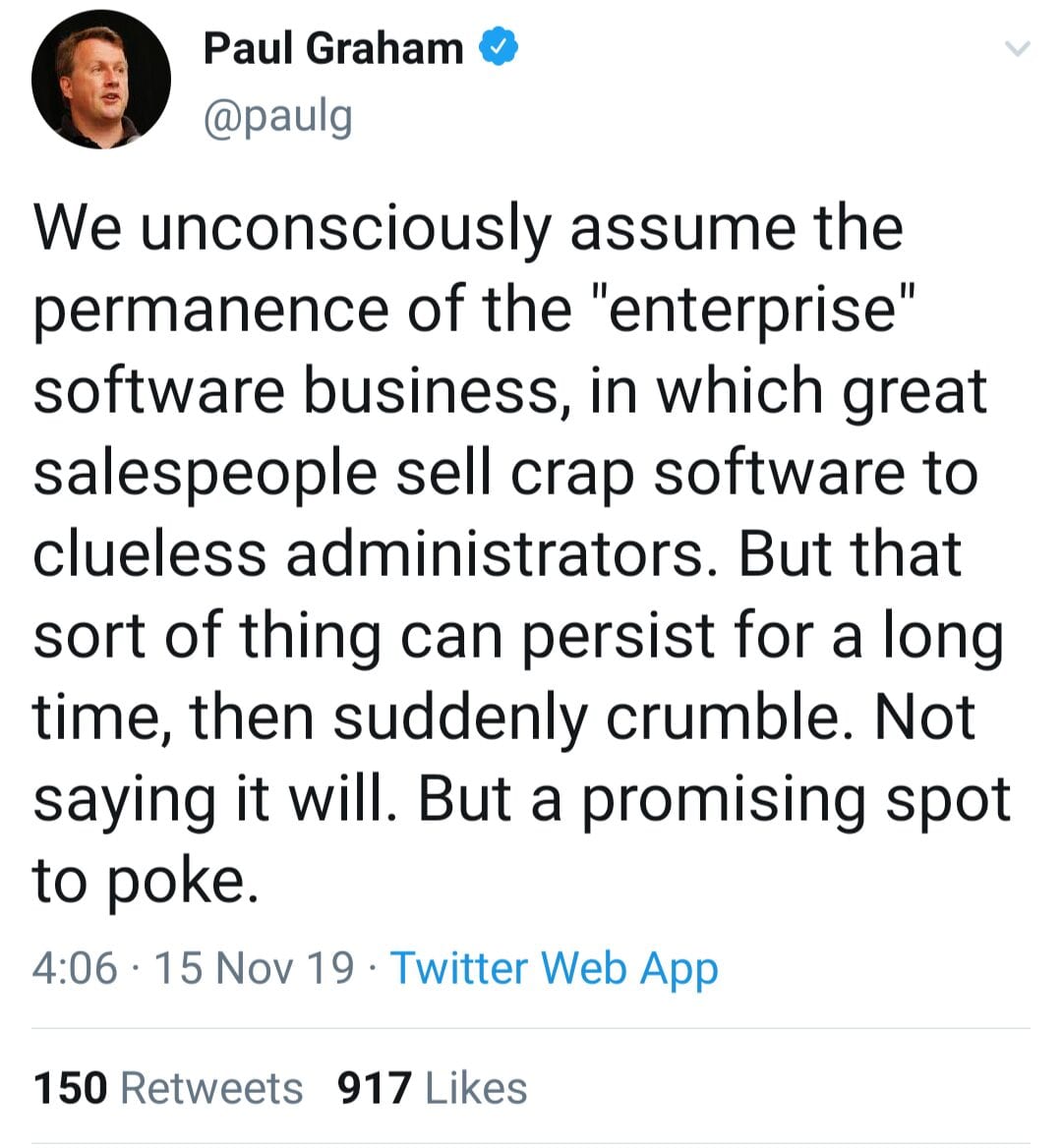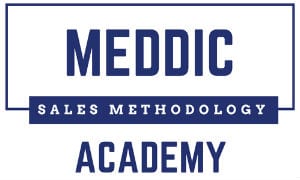An edition of this article, titled “Paul Graham doesn’t understand enterprise software” was published earlier this week on Venture Beat.
As a philosophy lover, I follow Y Combinator founder Paul Graham on Twitter mostly because of his philosophical comments and quotes related to technology. Yesterday, I saw this on my Twitter feed:

I wondered why he’s attacking enterprise software, which is the most valuable and respectable part of any software market. I looked a bit deeper and realized this isn’t new for him. In fact, Graham has clearly been haunted by enterprise software since forever. In 2007 he wrote: “Enterprise software companies aren’t technology companies, they’re sales companies, and sales depends mostly on effort,” not only denigrating the value of great enterprise software companies such as Salesforce, Oracle, and SAP but also the human skills of enterprise salespeople, insinuating they are hard workers rather than smart people.
I’ve worked in the enterprise software space for about 30 years, and it’s always been an island in the ocean of consumer software companies. In fact the only common point they have is software; their businesses are very different.
- Purchase process for a consumer (emotional, fast, unipersonal) has nothing to do with the enterprise (slow, power-based, ROI-based)
- Consumers don’t always need what they buy, while enterprises never buy if there is no pain
- Enterprise software products don’t always run on most basic consumer type laptops, Macs, or mobile, while consumer software needs to be light and portable
- Enterprise software prices are not available to the public
- Enterprise clients are almost married to their vendors and mostly loyal, while consumer software are often disposable with no dependency
- If something goes wrong with the QA during an update, the consequence is insignificant for a consumer software vendor (if online), while it could cost millions for each single client for an enterprise software company.
- Enterprise software companies solve much bigger and tougher problems and care less about UI or portability, while UI is the number one reason for success of consumer software.
Now, only as a consequence of all the above, enterprise software companies need to attract the best sales people — highly educated, experienced, smart, hard workers who are great at execution. These salespeople need to have high IQs AND high EQs at the same time, which makes them rare. You have to pay 5 to 10 times more than what you’d pay consumer software salespeople to attract these talents. So it’s not that great salespeople built crap software (to use his word) because they were good sellers and became successful. It’s the complexity of the problems enterprise software solves that required top sellers in these companies.
This is not the first time I’ve noticed that Silicon Valley veterans don’t get enterprise software. The get-rich-quick model doesn’t apply to enterprise software. Neither do some of the unethical practices that the likes of Facebook build their businesses on. They have no place in enterprise software. In the enterprise software space we don’t fake it until we make it. It’s a different world requiring different people with different culture and DNA.
I absolutely admire Y Combinator’s beautiful list of success stories. Unsurprisingly, however, I don’t see (m)any enterprise software companies on the list.
Silicon Valley unicorns, those that Graham’s companies dream of becoming, have a hard time entering the much coveted enterprise space. Knowing that there are high margins in enterprise, they all try to get in. Uber is right now trying to build an enterprise business entity so that executives will use Uber through an enterprise account. They have huge challenges and will learn the hard way that the enterprise world is a different place. Facebook keeps experiencing huge challenges dealing with enterprise products (Workplace by Facebook). Even Google Cloud is nowhere close to the market share the company was hoping for.
Another observation proving the lack of understanding Silicon Valley veterans have of the enterprise software market is the fact there are simply not many of great enterprise companies from the area. You’ll find just as many that started in Europe or on the East Coast. And some enterprise segments are completely absent from Silicon Valley. One of them is the PLM market (Product Lifecycle Management), worth $50 billion worldwide, which is dominated by vendors headquartered in Boston, France, Germany, or Texas. (Dassault, PTC, Siemens PLM,..). The only large player in the PLM market from Silicon Valley is Autodesk, which has never made it into the enterprise.
I’ll still follow Graham — I learn interesting things from him every now and then. That’s why I am going to finish this article with one of his lovely quotes:
“At every period of history, people have believed things that were just ridiculous, and believed them so strongly that you risked ostracism or even violence by saying otherwise. If our own time were any different, that would be remarkable. As far as I can tell it isn’t.” ― Paul Graham


Comments are closed.